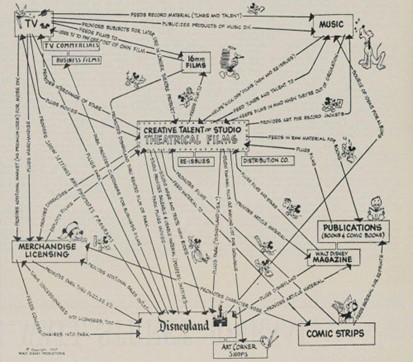Comms etymology: The word ’synergy‘ is much older than you think
Etymology author and Ragan content director Jess Zafarris explores the etymology of popular communications jargon.

As you may expect, the word “communicate” shares roots with words such as “common” and “commune.” All of these terms are from the Latin communis, which is now used in many different senses but literally means “shared by all.”
In that spirit, I look forward to sharing weekly word facts and etymology magic for inquisitive wordslingers in this and future editions of this column.
–
Today, the word “synergy” is practically the quintessence of soulless corporate jargon, but its history unveils some curiously ancient and enlightening — forgive me — key learnings.
Synergy is a Greek-derived word whose components give it the literal meaning “working together” (Greek elements syn- “together” + ergon “work”).
It’s first found in religious contexts. Several New Testament books, which were originally written in Greek by the Apostle Paul, contain the word συνεργοί (synergoi). Depending on the version, it’s typically translated into English as “fellow workers” or “labourers together”—that is, people who work synergistically.
“We are fellow workers (synergoi) with God; you are God’s cultivation, God’s building.” — 1 Corinthians 3:9-10
Beginning in the 17th century, this context led to the use of “synergy” and “synergism” to describe the Christian theological principle that cooperation between the divine and humanity’s free will can lead to salvation and things greater than the sum of one’s individual labor.
The takeaway: Collaboration (the Latin-derived word that also literally means “working together”) is divine. We’re starting to see why this word became a corporate cliché.
Another stepping stone in its journey to professional prosaicism was its use in toxicology beginning in the 19th century. Here, “synergy” describes instances when compounds work together to produce a more powerful effect than they would separately. The opposite of “synergy” in this context is called “antagonism,” when compounds work against each other and the effect is less powerful than what you would expect.
That’s why we opt for silo-busting synergy over interdepartmental antagonism, amirite?
As is the case with much of which shaped today’s business landscape and culture, “synergy” began its corporate life in the 1950s.
Russian-American mathematician and business strategist H. Igor Ansoff co-opted the term in the 1950s and 60s, particularly in his 1965 book Corporate Strategy.
Ansoff famously developed the Ansoff Matrix, a strategic product-marketing tool that is still in use today as a means of illustrating the balance of opportunity and risk in business decisions.
“A natural companion to the competitive advantage is the synergy component of strategy. This requires that opportunities within the scope possess characteristics which will enhance synergy.” — “Corporate Strategy”, 1965
It was also around this time that Disney published the following image to illustrate its business strategy. Although it wasn’t initially described as such by its creators, it has since been cited as one of the first and most iconic corporate synergy maps, cementing the term as one synonymous with cross-departmental collaboration.

Credit: Disney, 1957
So. as the leaders of today’s communications economy, it’s incumbent upon us to gauge whether “synergy” has been a net value-add to our lexical toolbox. What do we think: Workhorse or 800-pound gorilla? Let’s review our core competencies and circle back at the end of Q3 to discuss. (Sorry, sorry.)
Jess Zafarris is a content director, editor, journalist, speaker, social media engagement strategist and creator. Her 13 years of experience in media have included such roles as the Director of Content at Ragan Communications, Audience Engagement Director at Adweek, and Content Strategy Director and Digital Content Director for Writer’s Digest and Script Mag. Follow her on Twitter/Threads/IG and Tiktok @jesszafaris and connect with her on LinkedIn







